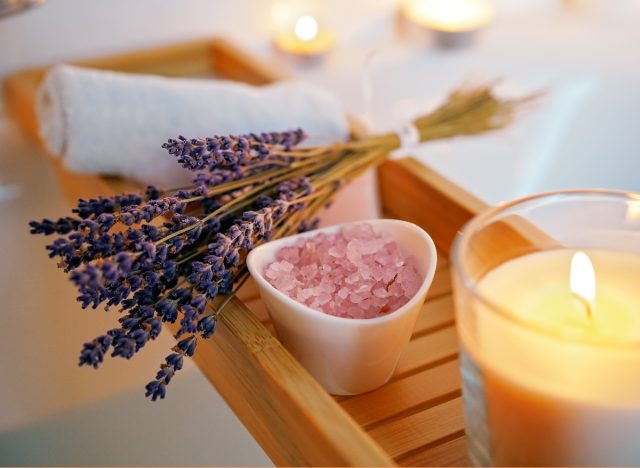8 Little Things You Can Do Every Night To Lose More Weight

Many things that can throw your weight loss progress off track occur late at night, whether that's enjoying a few more cocktails after dinner or stopping for fast food on your way home from work. On the other hand, developing the right nighttime routine can have a major positive impact on your weight loss progress.
"By sticking to a [nighttime] routine, you leave yourself less time to accidentally break your dieting streak," Mike Bohl, MD, MPH, ALM, a member of our Medical Expert Board and a certified personal trainer and nutrition coach who has helped develop the Body Program at Ro tells us.
Nighttime habits that help you lose weight fall into two buckets: (1) habits that affect how your body processes things while you sleep and (2) habits that help you get a restful night's sleep so you feel energized and ready to take on the next day.
When you get enough Zzzs (seven to nine hours), you'll have enough energy the following day to partake in activities that torch calories: "In order to effectively lose weight, you need to have the energy to burn enough calories throughout the day," says Dr. Bohl. "This can be through structured exercise—like going to the gym or going for a run—or it can be through other regular daily activities—like doing chores and going shopping," he adds.
We spoke with Dr. Bohl, who breaks down eight little things you can do every night to lose more weight. Getting into a consistent, healthy nighttime routine is the name of the (weight loss) game! Keep reading to learn more, and next, don't miss You'll Never Lose Weight if You Still Do These 5 Things, Expert Says.
The first bucket: how to keep burning calories at night.
If you want to lose more weight, don't eat too late.

You've likely heard this popular tip before—and it's actually a bit controversial, Dr. Bohl points out.
"No matter the time you eat, your body should process the calories in the same way. That said, people who tend to eat later into the night also tend to eat more calorie-dense food or may eat not because they're hungry, but because they're bored," he explains. "Avoiding eating late at night before bed is a good way to make sure you aren't consuming extra calories that you don't really need."
If you want to have a pre-bedtime snack, make sure it's one with casein protein.
Don't be too shocked to hear that there's an exception to habit #1. If you're in the mood for a pre-bedtime snack, make sure it contains casein protein, such as dairy products.
"Casein protein is slower-digesting, so a pre-bedtime snack can give your body protein it can use throughout the night for repairing and building muscle," Dr. Bohl explains.
Get some exercise—but time it correctly.

If you work out too close to your bedtime, you may find it challenging to fall to sleep. But, Dr. Bohl says the human body continues to torch calories during the hours following a workout.
"So, if you time your exercise correctly (such as a late afternoon workout session or an evening walk), you will continue to burn extra calories into your sleep time," he adds.
The second bucket: how to get a more restful night's sleep.
Don't drink alcohol before bed.

How many times have you enjoyed a night out with friends and found yourself waking up multiple times in the middle of the night? Drinking alcoholic beverages before bed is a bad habit for more than one reason.
"Alcohol comes with a lot of excess calories, so avoiding alcohol before bed fits into the first bucket as well and is a good way to keep your overall caloric intake lower," Dr. Bohl explains. "But alcohol also disrupts sleep, so if you drink a lot before bed, you might not feel as well-rested in the morning."
Set your bedroom to a cool temperature if you want to lose more weight.
"Some research suggests that temperature can impact how the body processes fat, and sleeping in a cooler room can help burn more calories overnight," Dr. Bohl tells us.
Plus, a cool room temperature promotes a great night's sleep! According to a poll by the National Sleep Foundation, sleeping in a cool environment is one of the most crucial aspects of solid, restful sleep. The ideal temperature to set your bedroom at is about 65 degrees Fahrenheit.
Avoid blue light.
All the screens in your life—your phone, laptop, and TV—emit blue light that can totally mess up your circadian rhythm, also known as "your natural sleep/wake cycle," Dr. Bohl explains.
If you use electronics too close to bedtime, you'll likely find it much more difficult to fall asleep. "[This can cut] into the hours you need and make it so you aren't as refreshed in the morning," Dr. Bohl adds.
Needless to say, scrolling through social media and binge-watching TV shouldn't be invited to your relaxing nighttime routine!
Stick to a solid schedule.
Sticking to a consistent schedule doesn't only apply to work. The same goes for your bedtime and waketime.
"Going to bed and waking up around the same time each day is also a great way to manage your circadian rhythm and make sure you're getting enough restful sleep each night," Dr. Bohl explains.
Have a relaxing pre-bed ritual, like sipping tea or taking a bath.

Winding down before you hit the sheets can alleviate any stresses you had during the day and calm your running mind. Whether you love sipping chamomile tea or drawing a soothing bath with bath salts, do whatever works best for you.
"If you're someone who has difficulty falling asleep, it can help to have a relaxing ritual that you do every night. This can help take your mind off the day's stresses so that when you're ready to get into bed, you're ready to drift off to sleep," Dr. Bohl concludes.









